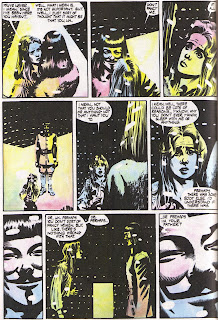 often frustrate or complicate the search for meaning, especially in so far as it relates to their own desire. The same, of course, can be said of Moore himself, whose stories leave the reader holding the bag, as it were.
often frustrate or complicate the search for meaning, especially in so far as it relates to their own desire. The same, of course, can be said of Moore himself, whose stories leave the reader holding the bag, as it were.One function of V's fixed expression and his tendency to speak in crytpic, highly citational language is to render his inner world inaccessible to both the characters in the novel as well as us. The abyss of his desire draws us in but also resists our attempts to pin down a definitive content behind his perpetual smile. Moore gives V no inner monologue to reveal his motivations and the glimpses we get of his past only comes through the writing of others. V, in other words, is an inscrutible void.
In a few moments of the novel, V's obtuseness clearly hystericizes Evey. The first hint at this comes when Evey questions why V has not attempted to sleep with her, although he has held her alone in his shadow gallery for so long. Following a dance, she poses a question to V. The next panel shows a close-up of V's always smiling face silently staring back at her. Next Evey questions V's sexuality--effectively she is guessing. Accompanying another even tighter close-up, V finally suggests that maybe he is her father. Although she grabs on to this possibility instantly, V tellingly blindfolds her and leaves her outside with no further explanation.

Her hysterisization continues when towards the end of the novel she chases after V as he prepares to exact his master-stroke against the government. Her frustration boils over when her questions about what she needs to do are met with yet more quotations, complaining, 'I hate this, all our conversations turn into crossword puzzles!' (223.5). Once again, V's static expression and refusal to provide easy answers leaves Evey at a loss for what he wants her to do.
As a character V doe snot provide answers but through his irritating refusal instead seems to open up hysterical questioning This places the onus for answering the questions that result on Evey and by extension the reader. By the end of V for Vendetta, one gets the sense of a negative critique of totalitarianism but all it provides in its place is the concept of anarachy. In this sense, Moore's text remains as inscrutible as his highly textual character, V.
Are there other examples of characters as embodiments of 'lack' in Moore's texts? Do they function in the same way?

I have been meaning to respond to this post for some time now, as I have continually been brought back to a remarkable scene in Vol. I of "League". Marc raises the question of 'lack' in Moore's text and it seems to me that the character of Hawley Griffin, the Invisible Man, is an exemplary figure in this regard. Griffin’s desires are founded on the fundamental paradox of his condition: Despite being invisible, he says “I still have human wants. It’s simply that my desires are more...transparent than the needs of other men.” Griffin’s condition allows him to more or less permanently inhabit a liminal sphere where his most craven desires can be fulfilled. When first introduced, he is the scourge of a home for fallen women, where he is discovered to have been systematically violating many of them. Typically, Moore invests his representation with a knowing wink to the reader, as the reformatory is in the shape of buttocks and has the word "schadenfreude" emblazoned across the entrance. This is one of the many ways in which Moore takes the apparent 'lack' of the Invisible Man and uses it to render something more visible. The degradation of the fallen women is indeed a potential site of pleasure for the reader (as it was during the nineteenth century as well), and the nakedness of Griffin's transgression problematizes any view of him thereafter as a laudable figure. This is not much different from many of the other titular characters, but in Griffin's case, it seems a particularly rich representation.
ReplyDeleteThe Invisible Man is deployed by Moore in an even more nuanced fashion later on, in the scene I initially alluded to. In this section, Griffin - without provocation - violently kills a British bobby and clothes himself in his uniform. This scene, and the spectacular artwork that drives it, is of fundamental importance to the narrative as a whole. By utlitizing the character of the Invisible Man, Moore is able to gesture towards the violence inherent in the physical presence of the law. As the League of Extraordinary Gentlemen assumes an extra-legal character, one of its members must first violently claim the authority of the law from its previous incarnation. That the act is paired with the visual iconography of a hollow bobby only further underscores the paradoxical grounding of all legal violence. Law may be conventionalized or historicized, but it can never wholly remove itself from the violence inherent in its maintainance. In the Invisible Man, Moore gives his reader a moment of clarity regarding this dynamic. Griffin appears to 'lack', but it is really his stubborn insistence which renders the lack at the heart of the law visible.